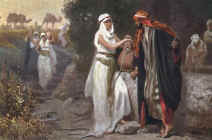|
|
2. |
She followed her husband wherever he went. (4:18-20)
She took here two sons and followed him even into Egypt. (:20) |
|
|
3. |
She went wherever her husband sent her.
Moses sent her back home while he stayed in Egypt. (18:1-2)
|
 |
|
B. |
Some duties Zipporah fulfilled unwillingly. |
|
|
1. |
Evidently Moses and Zipporah had failed to carry out the rite of circumcision on one son and it nearly cost Moses his life when he was called by God to serve Him. (4:24) |
|
|
2. |
Then Zipporah, obviously unwillingly, capitulated and circumcised her son Gershom in order to save her husband's life. (:25-26) |
|
|
3. |
We must, however, give Zipporah credit. When it finally came right down to it she did what was necessary for her husband's welfare. |
|
|
|
|
| V. |
Why did God try to kill Moses and force Zipporah to decide to circumcise her son? |
|
A. Scriptures on circumcision and the reasons for it.
Gen 17:9-14 And God said unto Abraham, Thou shalt keep my covenant therefore, thou, and thy seed after thee in their generations. This is my covenant, which ye shall keep, between me and you and thy seed after thee; Every man child among you shall be circumcised. And ye shall circumcise the flesh of your foreskin; and it shall be a token of the covenant betwixt me
and you. And he that is eight days old shall be circumcised among you, every man child in your generations, he that is born in the house, or bought with money of any stranger, which is not of thy seed. He that is born in thy house, and he that is bought with thy money, must needs be circumcised: and my covenant shall be in your flesh for an everlasting covenant. And the uncircumcised man child whose flesh of his foreskin is not circumcised, that soul shall be cut off from his people;
he hath broken my covenant. |
|
B. Why was the son not circumcised?
We can only speculate on the answer to this question.
Remember that Zipporah was raised in the ways of the heathen religion of Midian. Her father was the priest of Midian. Further, although circumcision is a widespread rite practiced historically from Egypt to Africa, and is even practiced among the aborigines of Australia as well as other groups worldwide (See Circumcision Note below), it seemed something foreign, or at least unappealing, to Zipporah. We can come to this conclusion by observing her actions and her statement after
circumcising her son. "Then Zipporah took a sharp stone, and cut off the foreskin of her son, and cast it at his feet, and said, Surely a bloody husband art thou to me." (Ex 4:25 & see also verse :26) This plainly shows her reluctance to perform the circumcision and her anger or, at least, her disgust at being forced to circumcise the boy to save her husband's life. The Bible does not explain why she reacted
this way but only reports that she did. Therefore, we can only speculate as to the reason why; but, using our knowledge of her heathen background, most likely from birth up, we are quite safe in assuming that something in the up-bringing caused her aversion to the idea and the act of circumcising her son. |
|
C. Why was the non-circumcision such a major thing that it put Moses' life in danger?
From the scriptures quoted above, Gen 17:9-14, it can be seen that for Moses' son to not be circumcised meant that he would be cut off from the People of God because he would not be partaker of the covenant that God made with Abraham and all of his descendents. Circumcision was the seal of the covenant in the very flesh of those who were partakers of that covenant. For Moses to not circumcise his son was a spurning of the covenant of God. It was a
statement, in flesh, that Moses either did not want his son to be a partaker of the covenant and wanted him to be cut off from The People of God, which is not likely, or it was a statement that Moses did not believe God concerning the covenant, which also seems unlikely. We are then left with two unlikely possibilities; but, one of them has to be true. Moses may have not consciously followed one of those two unlikely possibilities, but in his actions he promoted at least
one of them. From the account of his wife's reaction, we are led to speculate that she had protested the circumcision, probably loudly and adamantly so, to Moses when they had discussed the matter. If that be true, then the probability is that Moses had capitulated and allowed the circumcision to not take place. This was placing his wife's wishes above the commandment of God. As a leader he was expected to be godly in both word and deed. Not
circumcising his son would have been a very bad example to the people that God had chosen him to deliver from Egypt and to mold into a nation chosen by God as His own. How could the covenant carry any weight with the people if the "deliverer," the first leader chosen by God for them, did not consider it a "weighty" enough matter? How could they be expected to obey God's command if their leader wouldn't obey it? God did not deliver the people
because of their goodness, their righteousness, their obedience to Him. He delivered them because He had made a covenant with Abraham. He had chosen Moses as the one who would carry out the fulfillment of the Covenant but he failed to carry out its precepts within his own family. God had also chosen Moses as the the one through whom He would deliver the Ten Commandments, which were not yet written so the people could see them and know them, and yet here was Moses
disobeying a command of God that was already widely known. God could not allow this. When a man is chosen by God for a purpose, and since God expects that man to carry out the job given to him without fail, and given the magnitude of the job given to Moses of delivering God's law of life and death to The People, then Moses and his family had to be the first to obey. And God holds the man responsible for the leadership of the family. Therefore, his sin of
neglecting to obey God in the known commandment of circumcision and thereby failing to show the People that he and his posterity would be partakers in God's Covenant as an example to them to teach them be obedient to God's commands, was serious enough to warrant the death of Moses. Under the Law, synopsized in the Ten Commandments that would shortly be given to them when they reached the mountains of Sinai, it was sin and die. Under the Law sin had to be paid for by the death of the
sacrifices commanded or they had to be paid for by the death of the sinner. This was a picture of the absolute necessity of the perfect Sacrifice that would one day come, Messiah, Jesus Christ, who would release us from the law of sin and death. Back to Zipporah and Moses, how could God use Moses to deliver the Law of life and death if Moses himself were not obedient to the law of life and death? The People would see that God's law was binding upon both leaders and
followers. Moses was under obedience upon pain of death concerning life and death commandments as much as the lowliest of those in Israel would be. If Moses would not obey, then he had to be replaced. In order to replace disobedient Moses with someone more obedient, God was going to have to kill him to get him out of the way. (See the story of Saul and David; how God had to kill Saul before David could take over the job of being King.) God, then, had to do one of two things: either kill
Moses and replace him or convince him to obey. The latter is what happened.
D. Why was it Zipporah who carried out the circumcision?
Moses and Zipporah, the two that were one flesh, were convinced to obey. Zipporah may have realized that it was her protestations that had carried enough weight to convinced Moses to disobey God and that she had a major part, thereby, in bringing this impending judgment upon them. She may have felt that she was the one most responsible for the transgression, and that motivated her to immediately grab the instrument and circumcised the boy. She did so under protest, as we have already seen by the biblical
details surrounding the deed, nevertheless, she did do it. Another possibility is that she realized that her husband was going to die because of this whole incident and it angered her and she grabbed the instrument and circumcised the boy as an expression of her anger, and possible frustration. Either one of these motivations is possible. Nevertheless, either one of these two possibilities would serve to show that obedience is supreme.
E. The supremacy of obedience.
Obedience is always supreme. Even under the Old Testament, which was centered around the Law, obedience was above The Law which was to come later on in Exodus. The Scriptures teach us in, I Sam 15:22, "Behold, to obey is better than sacrifice". And that includes all obedience- even obedience under protest. Sometimes, for us human beings, the understanding lags behind the obedience, but to obey is always best. We have to
then deal with the sin of our protestations and reticence, true, but we have already taken the first step toward resolution of that sin by obeying in the first matter.
We dare not be critical of Zipporah because we all will, sooner or later, be confronted with something we don't understand or don't agree with and we will, hopefully, obey under protest just as Zipporah did; but we will obey, as she did. That is because, like her, we are human beings and because of that we err. Don't misunderstand what I mean by that statement. When we obey under protest, being human may be the reason that we do that but it certainly does not excuse that
behavior and, therefore we will have to deal with that later.
But in the final analysis, to obey under any circumstances is best. Then later God will help us come to terms with our feelings in the matter.
|
|
|
| VI. |
As Moses' wife, Zipporah was intimately involved in the freeing of God's People from the bondage of Egypt.
Gen 2:24 et al "... and they shall be one flesh."
Whatever the husband is involved in, the wife is involved in. She shares equally in the blessings and the cursings that fall upon the husband just as he shares in her's. This can be seen in the disaster that befell the wives of Dathan and Abiram for whom the ground opened up and swallowed them alive because of the sin of their husbands. They were warned by God to separate themselves from the tents of their sinning husbands but they did not obey and were consumed in the catastrophic
consequences of God's just judgment and punishment of the husbands.
Although wives are commanded to be in obedience to their husbands, still, when the husband disobeys God and leads his wife in an ungodly direction, then the wife is freed from that commandment of obedience. They are to obey God first, and their husbands second. Acts 5:29 "... We ought to obey God rather than men." And I need also to mention Annanias and Saphira of the Church at Jerusalem, both of whom suffered the same judgment and consequences for their
sins against God. The husband for lying to God and his wife for agreeing to the lie. (Acts 5:1-11)
On the other hand, the wives of obedient husbands are partakers of the blessings that God brings upon their husbands when they follow their husbands as they lead them in a godly direction. The current study of Zipporah is a good example of this. She reaped the same reward as did her husband, Moses. They both saw, and lived, many miracles of God as He freed His people from the bondage of Egypt and sustained them in the wilderness. |


